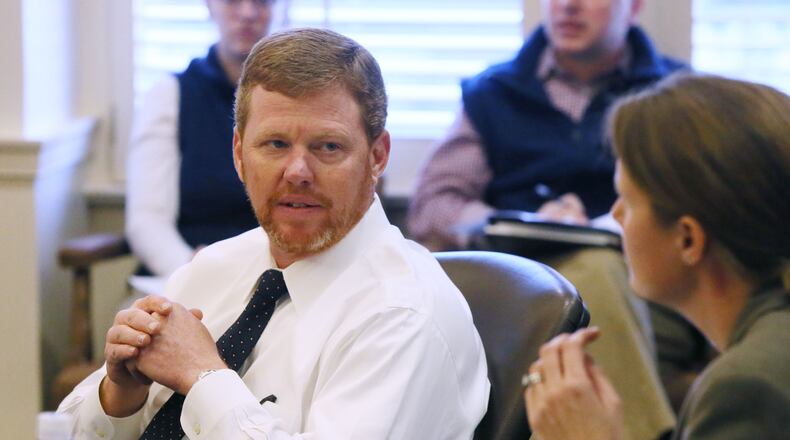Five days until vote
Thursday marks five days until Americans vote in federal and state races on Nov. 8. All year, The Atlanta Journal-Constitution has brought you the key moments in those races, and it will continue to cover the campaign's main events, examine the issues and analyze candidates' finance reports until the last ballot is counted. You can follow the developments on the AJC's politics page at http://www.myajc.com/s/news/georgia-politics/ and in the Political Insider blog at http://www.myajc.com/s/news/political-insider/. You can also track our coverage on Twitter at https://twitter.com/GAPoliticsNews or Facebook at https://facebook.com/gapoliticsnewsnow.
When Gov. Nathan Deal’s staff asked Georgia school districts for a record of dues collected for teacher organizations, educators figured it wasn’t just a case of routine government fact-finding.
They saw it as a precursor to the political payback ahead for fighting the governor’s Opportunity School District proposal, Amendment 1 on Tuesday’s ballot.
“It’s unfortunate about the governor’s implied retaliation toward all education associations that disagree with him on this issue,” said Sid Chapman, the president of the Georgia Association of Educators. “However, we strongly feel the defeat of Amendment 1 is too important to worry about political consequences. We feel the well-being of our children is worth the risk.”
The governor’s office said it only wants to make sure teacher groups such as the GAE and the Professional Association of Georgia Educators are treated the same way as charitable organizations, such as the United Way.
The battle for Amendment 1, which would allow the state to directly intervene in chronically low-performing schools, has been costly, bitter and at times personal. Opponents have spent big money on TV ads saying that the power-hungry state is trying to wipe out local control by "taking over" schools. Local school boards have very publicly voted to oppose the measure. Critics have characterized a contract the governor's daughter-in-law has to raise money for a fund heavily bankrolling the pro-Amendment 1 campaign as a "pay-for-play scheme to move money from the schoolhouse to Deal's house."
Deal, meanwhile, has promised closer scrutiny of local school boards, whom he accused of often doing too little to help children in poor-performing schools. Deal staffers said the governor is ready to take away local school boards' flexibility over how they use state money for teacher pay raises. The Atlanta Journal-Constitution reported last month that only 40 percent of districts used the $300 million the state allocated for raises this year for permanent pay hikes.
About two weeks after Deal Chief of Staff Chris Riley filed an Open Records Act request for the dues information, about two dozen districts hadn’t responded with the information, according to records reviewed by the AJC. One large metro Atlanta district was on that list — DeKalb County — but officials there sent the AJC the dues report and said it was submitted to the governor’s office Monday.
The data gathered by the governor’s office shows that districts collect more than $18 million a year in dues from teachers and other personnel for PAGE and the GAE, the two largest teacher groups in the state.
The GAE's national parent, the National Education Association, has poured at least $4.7 million into the campaign to defeat Deal's Amendment 1. Part of the GAE's dues go to the NEA, so Chapman said the national organization is spending money on the campaign that was contributed by Georgia teachers.
Teacher groups have speculated why the governor’s office wants the information.
They are concerned that the governor’s office asked for the information to prop up future legislation to prevent educators from using payroll deductions to join professional organizations, such as the GAE and PAGE, or to force either the groups or members to pay administrative fees.
Jen Talaber Ryan, the governor’s spokeswoman, said the administration is trying to find out whether school districts keep any of the dues money for overhead, like other charitable organizations.
“The Georgia State Charitable Contributions Program allows state and local employees to donate to charities of their choice, such as the American Cancer Society or United Way, through payroll deductions,” Ryan said. “The state is required to utilize a portion of these contributions to cover overhead and processing costs.
“To ensure that charities, nonprofit groups and membership organizations are all treated equitably, information was sought from local school systems,” she said. “This request included asking local districts whether processing fees were collected for said membership organizations.”
Systems that responded to the administration’s request said they didn’t charge such administrative fees.
Craig Harper of PAGE said most school districts allow payroll deductions for voluntary benefits costs, contributions to organizations such as the United Way, to education foundations, and other community services, as well as to PAGE and the GAE.
“This is no different than payroll deductions for other voluntary benefits, including life insurance, dental or eye care plans, flexible spending accounts, pre-paid legal services for family members or even pet insurance,” he said.
Harper said his organization thinks the governor’s interest in payroll deductions is aimed at proposing legislation to eliminate or restrict professional associations dues from being collected or to mandate districts assess administrative fees.
“Targeted legislation like this would send a clear signal to Georgia’s educators regarding Governor Deal’s displeasure with educators and their advocates for speaking up about the issues that matter to them,” he said. “And any attempt to dictate how local districts administer their day-to-day payroll processes would be an unnecessary and unwarranted state overreach into the administrative decision-making of local boards of education and superintendents.”
About the Author
Keep Reading
The Latest
Featured




